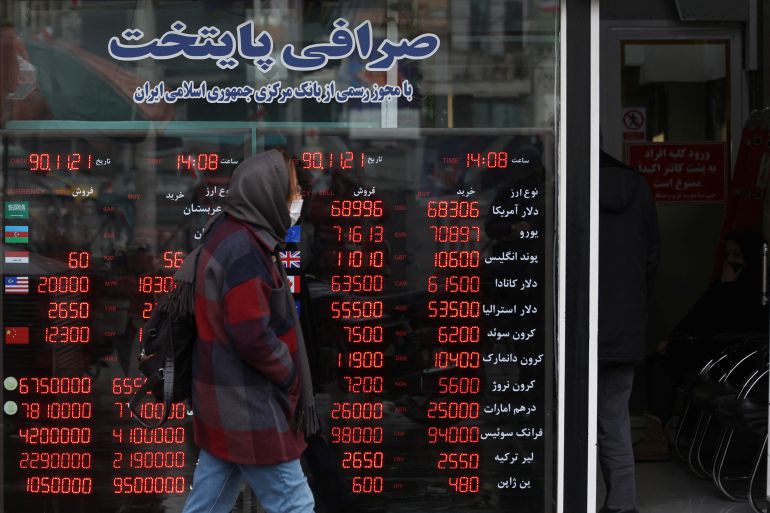Iran currency falls to record low against dollar as tensions with US mount
As traders opened on Saturday, the exchange rate fell to 1,043,000 rials to the dollar.

Published On 5 Apr 20255 Apr 2025
Iran’s rial currency has hit a record low against the US dollar amid growing tensions between Tehran and Washington over Iran’s nuclear programme.
The exchange rate had plunged to more than 1 million rials during festivities for Persian New Year, Nowruz, as currency shops closed and only informal trading took place on the streets, creating additional pressure on the market.
Recommended Stories
list of 3 itemsend of list
As traders resumed work Saturday, the rate fell even further to 1,043,000 to the dollar. Some traders in Tehran even switched off electronic signs showing the going rate as uncertainty loomed over how much further the rial could drop.
Iran’s economy has been severely affected by international sanctions, particularly after President Donald Trump unilaterally withdrew the US from Tehran’s nuclear deal with world powers in 2018.
After Trump returned to the White House for his second term in January, he restarted his so-called “maximum pressure” campaign targeting Tehran with sanctions and again went after firms trading Iranian crude oil, including those selling at a discount in China.
Advertisement
Trump wrote to Iran’s Supreme Leader Ayatollah Ali Khamenei trying to jumpstart direct talks between Tehran and Washington. So far, Iran has maintained it is willing to hold indirect talks.
Iranian President Masoud Pezeshkian on Saturday said his country was willing to engage in dialogue with the US as equals, without clarifying whether Tehran would participate in direct talks.
“Today, America is not only humiliating Iran, but also the world,” Pezeshkian added, in an apparent reference to recent policies adopted by Trump, including imposing tariffs on imported goods.
“If you want negotiations, then what is the point of threatening?” he said.
Western countries, led by the US, have for decades accused Tehran of seeking nuclear weapons. Iran rejects these allegations and maintains that its nuclear activities exist solely for civilian purposes.
In 2015, the country reached a landmark deal with the permanent members of the UN Security Council, namely the US, France, China, Russia, and the United Kingdom, as well as Germany, to regulate its nuclear activities.
In 2018, during Trump’s first term in office, Washington withdrew from the agreement and reinstated sanctions. In response, Iran rolled back on its commitments under the agreement and accelerated its nuclear programme.
On Monday, Ali Larijani, a close adviser to the supreme leader, warned that while Iran was not seeking nuclear weapons, it would “have no choice but to do so” in the event of an attack against the country.
Advertisement
